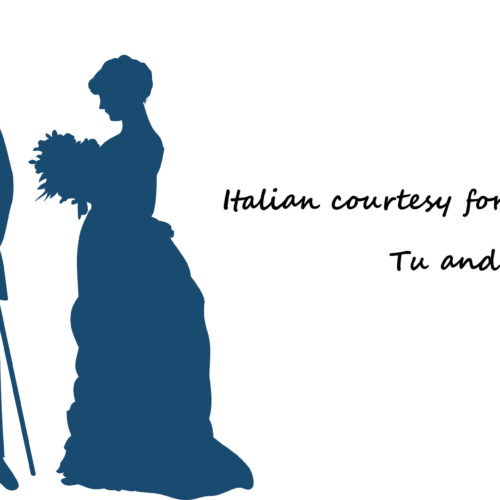The trapassato prossimo is a tense that is used to express what you had done.
example: By the time you arrived we had already finished = Ora che tu arrivavi noi avevamo già finito.
Here’s how you do it:
For most verbs you will need to use the imperfect of the verb “avere” and then add your past participle.
So the formula is the imperfect of avere + the past participle
OK, so we need to learn the imperfect of the verb “avere” which means “to have”
avere in the imperfect tense
avevo I
avevi you (singular)
aveva he/she
avevamo we
avevate you (plural)
avevano they
Avevo parlato= I had spoken
Avevo visto = I had seen
Avevo finito = I had finished
Ero andato = I had gone
Now we need to learn how to form a past participle.
To form a past partciple, start from the infinitve form of the verb. Infinitives end in either “are” “ere” or “ire”
If the infinitive ends in “are” then you cut off the “are” and add the letters “ato” parlare —> parl —> parlato = spoken
If the infinitive ends in “ere” then you cut off the “ere” and add the letters “uto” vedere —> ved —> veduto = seen
If the infinitive ends in “ire” then you cut off the “ire” and add the letters “ito” finire —> fin —> finito = finished
OK, now we know how to conjugate the verb avere and how to form a past participle. Let’s put it all together and make some sentences.
I had spoken
1. Use the above chart to find the “I” form of the verb avere in the imperfect. The “I” form is avevo.
2. Find your infinitive “to speak” which is “parlare”
3. Cut off the “are” (Now you are left with parl)
4. Add “ato” because parlare is a verb that ends in “are”. parlato
5. Now take the two bold words and put them together: Avevo parlato = I had spoken.
_____________________________________________________________
However, to form the trapassato prossimo, you do not use the verb “avere” with every single verb in Italian. With certain verbs you must use the imperfect form of the verb “essere” and then add the past participle.
Here is a list of those verbs. The past participle is next to each verb.
INTRANSITIVE VERBS: PAST PARTICIPLES
andare (to go) andato
arrivare (to arrive, to reach) arrivato
cadere (to fall, to drop) caduto
costare (to cost) costato
crescere (to grow) cresciuto
diventare (to become) diventato
durare (to last, to continue) durato
entrare (to enter) entrato
essere (to be) stato
morire (to die) morto
nascere (to be born) nato
partire (to leave, to depart) partito
uscire (to exit) uscito
venire (to come) venuto
Here is the imperfect of the verb essere
ero (I)
eri (you singular)
era (he/she)
eravamo (we)
eravate (you plural)
erano (they)
Let’s try one: You had gone.
1. Use the above chart to find the “You” form of the verb essere in the imperfect. The “You” form is eri
2. The infinitive “to go” is andare
3. Cut off the “are” (now you are left with and)
4. Add “ato” because andare is a verb that ends in “are” (now you have andato.)
5. Put the two bold words together and you get eri andato = You had gone.
Please note that when using “essere” in the trapassato prossimo, you must make the past partciple agree in number and gender with the subject.
The spelling of the past participle changes depending on the number and gender of the subject.
Let’s take the past particple “andato”. If the subject is masculine singular, the past participle ends in “o” — andato. If the subject is feminine singular the past particple ends in “a” —andata. If the subject is masculine plural the past particple ends in “i” — andati. If the subject is feminine plural the past participle ends in “e” — andate.
Exercise:
1) Carlo era contento, perchè (avere) finito il lavoro in anticipo. Carlo was happy because he had finished the work in advance.
2) Mia mamma (risparmiare) dei soldi e me li ha regalati per la mia laurea. My mother had saved money and gave them to me for my degree.
3) Il maestro mi (premiare) , perchè avevo fatto un buon compito = Teacher had rewarded me because I did a good homework.
4) Claudia non (essere stata) all’Opera prima di quella sera. = Claudia had never been to an Opera before last night.
5) (avere) mai (visitare) l’Italia prima dell’anno scorso? = Had you ever visited Italia before last year?
6) Non fummo capaci di prendere un posto in aeroplano, perchè non (avere prenotare) in anticipo. = We were not able to make a reservation in the airplane, because we had not booked in advance.
7) Elena era nervosa, perchè (avere discutere) con suo padre = Elena was nervous, because she had argued with her father.
Answers: Aveva finito, aveva risparmiato, aveva premiato, non era stata, avevate mai visitato, avevamo prenotato, aveva discusso.
Article by Giacomo DePasquale




























What’s Going down i’m new to this, I stumbled upon this I have
discovered It absolutely useful and it has helped me out loads.
I’m hoping to give a contribution & help other users like its helped me.
Good job.
You really make it seem so easy with your presentation but I find this
matter to be actually something which I think I would never understand.
It seems too complicated and very broad for me.
I’m looking forward for your next post, I will try to get the hang of it!